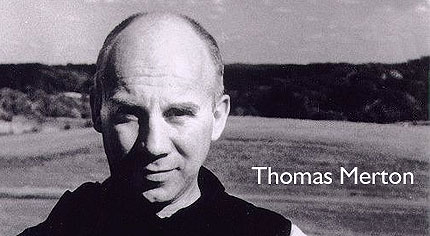Hero #088: Thomas Merton … (03/07/16)
Born in 1915, Thomas Merton was was an American Trappist monk, writer, mystic, poet, social activist, and student of comparative religion. He wrote more than 70 books (including his bestselling autobiography Seven Story Mountain, published in 1948) over the course of his life, mostly on spirituality, social justice and a form of pacifism that was quiet but staunch.
By the 1960’s, Merton had already arrived at a belief system that warmly encompassed all of humanity, and he became concerned about the world in general and its most pressing social issues, such as peace, racial tolerance, and social equality. He had by this time developed what can only be termed a “personal radicalism” which had transcendence his own personal religious ideology; one that was rooted above all in a non-violence that was as active as it was unconditional.
Merton was perhaps most interested in—and, of all of the Eastern traditions, wrote the most about— the concepts and tenants of Zen. Having studied the Desert Fathers and other Christian mystics as part of his monastic past, Merton had already developed an intimate understanding of what it was those men sought and to a degree what they experienced in their seeking. As such, it was perhaps easier for him than most to uncover the many parallels between the language of these Christian mystics and the language of the Zen philosophers.
Merton was an avid champion of interfaith understanding, pioneering dialogue with prominent Asian spiritual figures. Walking his talk, he personally engaged in meaningful correspondence with prominent religious leaders from various other faiths, including the Dalai Lama, the Japanese writer D.T. Suzuki, and the Vietnamese monk Thich Nhat Hanh.
“I am against war, against violent revolution, for peaceful settlement of differences, for nonviolent but nevertheless radical changes.” ~ Thomas Merton
“The beginning of Love is to let those we love be perfectly themselves, and not to twist them to fit our own image … To consider persons and events and situations only in the light of their effect upon myself is to live on the doorstep of hell … Love seeks one thing only: the good of the one loved. It leaves all the other secondary effects to take care of themselves. Love, therefore, is its own reward.” ~ Thomas Merton
“The truth that many people never understand, until it is too late, is that the more you try to avoid suffering the more you suffer, because insignificant things begin to torture you in proportion to your fear of being hurt … A life is either all spiritual or not spiritual at all. No man can serve two masters. Your life is shaped by the end you live for.” ~ Thomas Merton





 ;
;